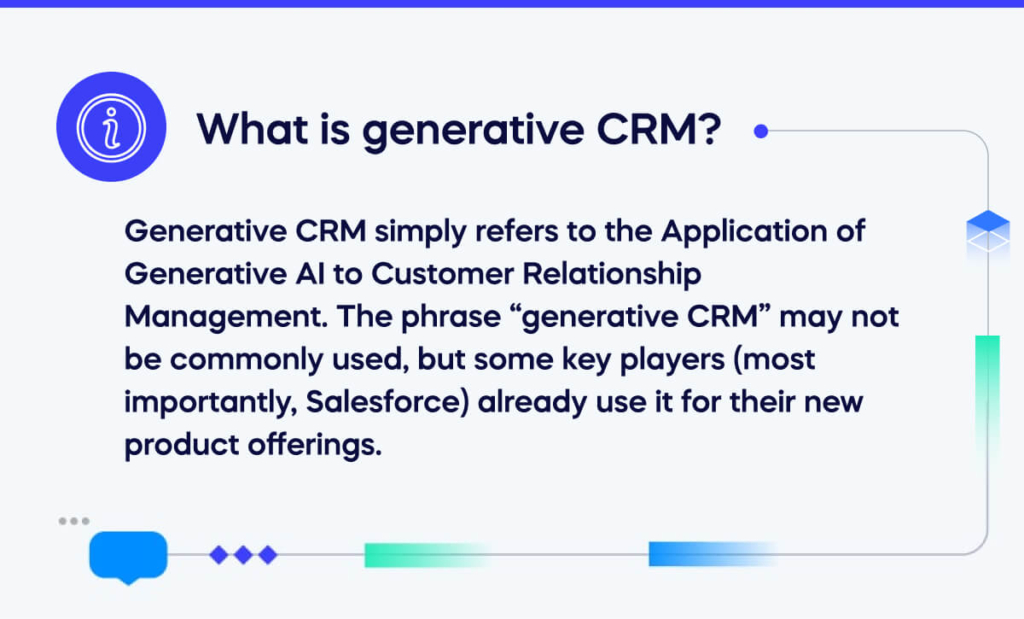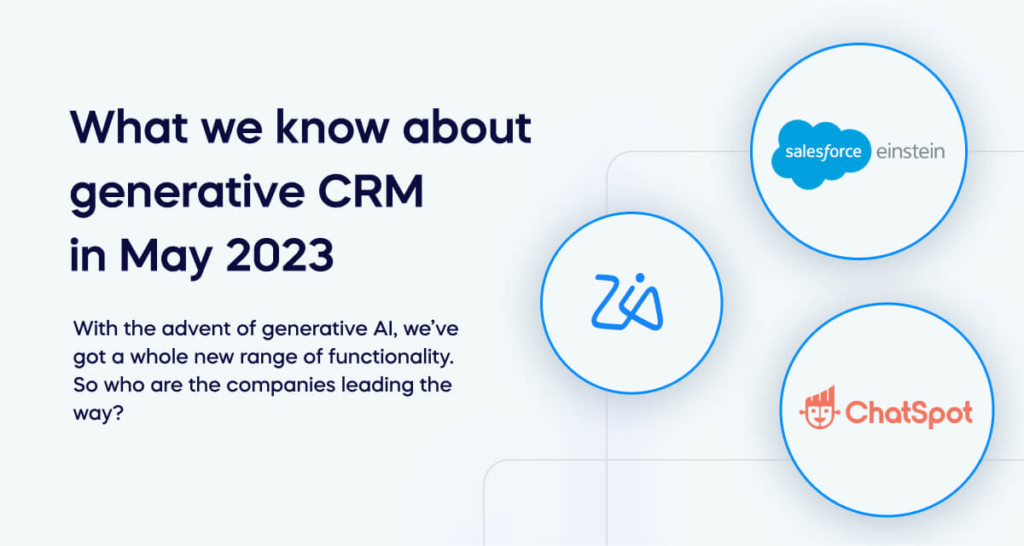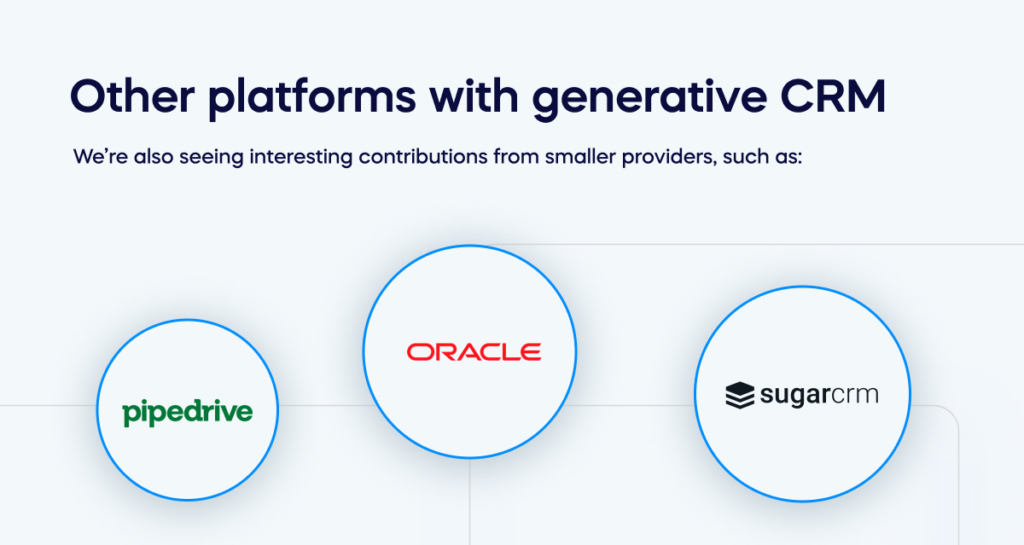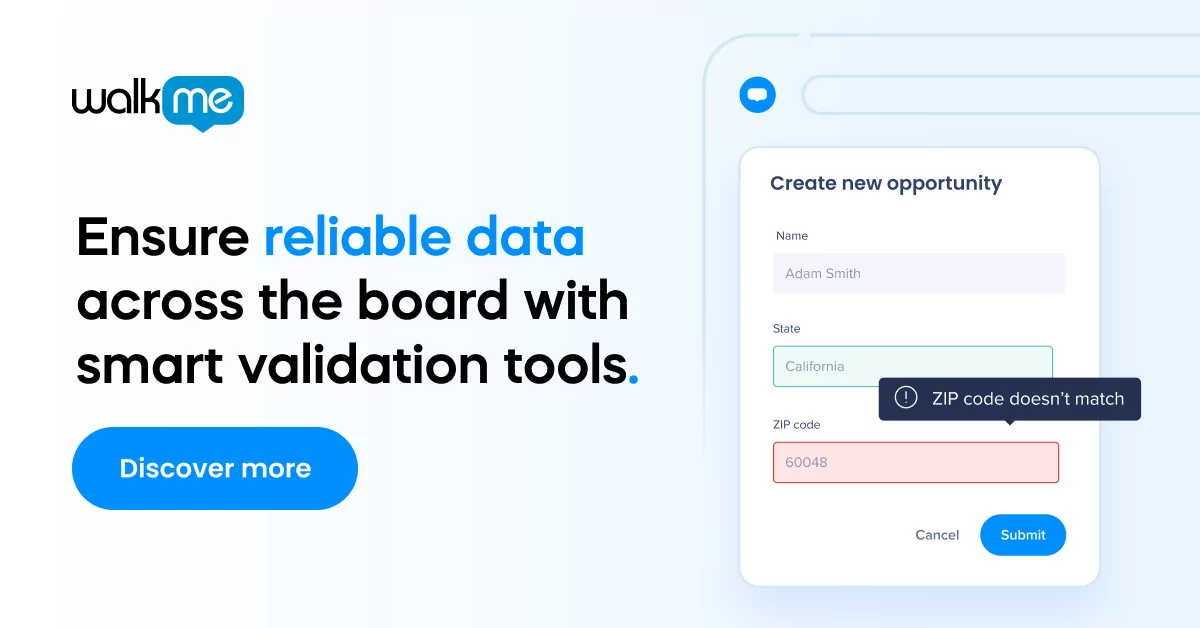Generative AI for CRM? Welcome to 2023!
Of course, AI has already been a part of CRM software for years. In 2016, Salesforce’s Einstein turned the platform into the “world’s smartest CRM,” in the words of CEO Marc Benioff.
With the widespread availability of generative AI, people are eager to integrate generative features into various applications, including digital art, search engines, and even CRM!
We are still waiting to see how generative AI will support CRM in this fast-evolving field. But as Gartner’s 2022 overview of AI for business explains, we know that there are two major benefits to AI intervening in business processes: to improve working methods and to reduce labor-intensive tasks.
So let’s take a look at how generative CRM could help.
We’ll give a quick explanation of what generative AI means in CRM. Then, we’ll mention the leading software platforms releasing generative AI assistants – including Salesforce, Hubspot, and Zendeks. To help us all calm down, we’ll explain where generative CRM sits on the Gartner Hype cycle. And finally, we’ll look at some of the fears people might have about these developments.
AI technologies like intelligent automation have been on the scene for years. Let’s see how generative CRM could take us to the next level.
What is generative CRM?

Generative CRM simply refers to the Application of Generative AI to Customer Relationship Management. The phrase “generative CRM” may not be commonly used, but some key players (most importantly, Salesforce) already use it for their new product offerings.
In case you’ve been living under a rock recently, Generative AI is the next generation of Artificial Intelligence. Generative AI is AI that can generate or create content that seems “new,” – such as images, text, music, or even video. Generative AI uses existing data to produce “unique artifacts that resemble but don’t repeat the original data.” As we have seen in 2022 and 2023, Generative AI has diverse applications in art, design, storytelling, problem-solving, and coding.
Generative AI has shown the world the creative possibilities of technology today. But some of its most interesting applications are for the most boring tasks.
Generative AI can quickly help to automate tedious tasks in content creation, customer service, and data analysis. The results might not be show-stopping. But these processes can be a lifesaver for tired workers in high-pressure work.
What we know about generative CRM in May 2023

AI capabilities have been a part of CRM packages for several years now. And we’re getting used to seeing AI shape the digital workplace.
But with the advent of generative AI, we’ve got a whole new range of functionality. So who are the companies leading the way? In this section, we’ll examine what Salesforce, Hubspot, Zoho, and others are doing to set the agenda in generative CRM.
Salesforce Einstein
In March, Salesforce announced that their Einstein would be upgraded to include extensive generative AI capabilities.
Salesforce users are still confused about the full possibilities of this development. After all, customers are getting a lot of announcements – without necessarily seeing much software to trial.
We know it will operate across sales, customer service, marketing, and IT, with the potential to improve Salesforce Flows.
ChatSpot from Hubspot
Hubspot’s ChatSpot promises to offer useful features from a simple chat prompt.
It will be able to draft emails, identify potential clients, perform lead management tasks, and support periodic reporting.
Perhaps not all of this is new. But suddenly, if you want to search for “mid-size cycling companies in England,” – you’ve got a handy little bot to do it for you.
Zia from Zoho
Zoho’s Zia will be a useful tool for sales teams and managers.
It will be able to offer business intelligence reports, make grammar suggestions, streamline customer service, and more.
If you’re already using Zoho, it will be worth looking at.
Other platforms with generative CRM

We’re also seeing interesting contributions from smaller providers, such as:
- Pipedrive sales assistant
- SugarPredict from SugarCRM
- Oracle’s range of AI applications
Realistically, we’ll expect every CRM provider to introduce some generative CRM function in the next twelve months. Watch this space!
Generative AI and the Gartner Hype Cycle
Let’s take a moment to step back from the hype around AI. Beware – you might just find that this bursts your AI bubble!
Undoubtedly, AI is an amazing innovation for the 2020s and beyond. But it is still very early days. Plenty of people are becoming wildly over-excited about generative AI. LinkedIn influencers are presenting themselves as “Chat GPT experts.” And even if you’re retired, you’ve probably heard of what AI can do today!
There’s a lot of enthusiasm – but it can’t last. Gartner’s hype cycle helps us understand. In September 2022, a Gartner analysis suggested that Generative AI would be just at the start of the “peak of inflated expectations.” In 2023, we are still climbing to that peak.
We’re still at a “wait and see” moment for the industry.
Tech innovators might just find themselves in the trough of disillusionment before they know it. With legal and ethical barriers to face, maybe this wouldn’t be so bad.
This doesn’t mean that generative AI is going to go away. The technology is genuinely useful: so hold tight and wait for the slope of enlightenment.
The challenges of generative CRM
Applying a deeper level of AI to CRM sounds like a win-win situation. Bosses want to get their teams working as effectively as possible. And so far, generative AI has shown that it is easy to pick up, think about, and use. In some cases, it can produce incredible results.
So when you apply generative AI to CRM, the results can only be good – right?
Not quite.
We must remember that generative AI often isn’t as smart as people think it is. ChatGPT and its cousins can do some things very well. But many activities are better handled by a human. Sensitive emails, personalized outreach, and empathetic communication? Don’t risk it with a bot.
Ultimately there needs to be some risk management for every company. The Gartner MOST framework provides one tool. In the future, we may find more restrictive barriers to using generative AI.
Is Generative CRM the Future?
A 2020 Gartner ebook noted that very few sales departments can use data for “even rudimentary machine learning or artificial intelligence (AI).” In 2023, this is less true: but year after year, AI will become increasingly available to generative CRM processes.
Most technology leaders are under pressure to introduce new solutions – as WalkMe’s 2022 report on the state of digital adoption shows.
As the initial buzz of generative AI dies down, we see more and more niche applications – generated by companies of all sizes. We still haven’t got a good understanding of the limitations of AI. So, it’s wise that companies invest heavily in this system.
2023’s AI bubble might just burst. But in its wake, there’s no doubt that we’ll all be using features that, a short time ago, we would never have dreamed of.


